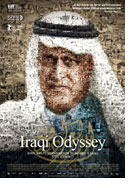

Opening 14 Jan 2016
Directed by:
Samir
Writing credits:
Iraqi director Samir (no further names) shares the destiny of his large family scattered from Iraq into the diaspora. His grandfather had seven children. From this family tree grew Samir’s five aunts and uncles, 20 cousins, and six siblings. They represent just a few of the four million Iraqis living abroad. Samir and his parents immigrated to Switzerland in the 1960s, where he still lives. To research the film, he returned to Iraq after 20 years to talk to family members still there. (His father had returned earlier to Iraq from Switzerland, but was killed in the Iraq-Iran war.) Samir then takes us to relatives in Moscow and to Buffalo, New York, (where his aunt exclaims upon arrival to take refuge: “What kind of a run-down place is this?”). In spite of long-term residency in other countries, they still deeply miss their home country. It’s amazing that the relatives have been able to keep such close contact; luckily they could provide many photos for the film.
Iraqi history comes to light. Samir touches on the Ottoman era, the British Mandate, independence, the Baath Party takeover, and then the final radicalization by Saddam Hussein. He is not squeamish about pointing the finger at the U.S. government under President Bush and its responsibility in the “collapse of large parts of this world.” Iraqi Odyssey played at the 2015 Berlinale in the Panorama section. Samir was present for Q & A, accompanied by various family members. His motto is, “You cannot shape your future if you do not know your past.” He has a long career as producer, director, and writer and said that after having already made a film about Iraqi Jews (Forget Baghdad: Jews and Arabs –The Iraqi Connection), he could definitely shine the spotlight on his own family. This film would be especially interesting to those of us who are also living long-term in a foreign country, as well as those of us living in countries now taking in hundreds of refugees, who may also never return to their origins, and are faced with the problem of furthering contact and communication and adjustment. (Becky Tan)